Rowland leads the Connecticut Task Force of Veterans for Political Innovation and also sits on the State Central Committee for the Griebel-Frank for CT Party. He is co-founder of a statewide RCV coalition.
The Millstone Power Station provides more than 47 percent of Connecticut’s electricity, and more than 90 percent of its carbon-free electricity. It is Connecticut’s only nuclear power plant and it will help us understand why ranked-choice voting is so important.
Gov. Ned Lamont recently received the endorsement of the Griebel-Frank for CT Party, putting him on a third line on November’s ballot. This endorsement was conditioned on the governor introducing legislation to implement ranked-choice voting, also known as instant run-off elections. To understand why this is so important to the health of our democracy, it is helpful to use Millstone as an analogy.
All nuclear-produced electricity is made by nuclear fission, splitting atoms apart to release energy in the form of heat and radiation. The energy released is captured and turned into electricity. This process of division produces harmful byproducts and toxic waste.
Our current political systems operate in much the same way. Dividing the electorate produces energy, and that energy is harnessed by politicians to further their goals, which are often not to solve problems but to simply consume that energy, maintain their power and continue to divide.
The toxic byproducts are all around us. Polarization, hyperpartisanship, politicizing issues that are not political, mud-slinging, obstructionism, and on and on. Our current method of electing officials – plurality voting – supports this division much like reactors support nuclear fission. To succeed in a plurality election, one must only receive the most votes, not a majority.
The incentives created by that system work to keep division in the structures of our politics. They incentivize behavior that is toxic, appealing to only the most extreme voters and energizing them to vote by convincing them our democracy is in peril or the identity of their country is in jeopardy. In reality, however, it is not the issues and policies of the day that divide us. It is the process. Division is the process of creating energy for politicians, energy that is captured at the polls.
An alternative form of nuclear energy is fusion, where atoms are combined to form larger atoms and energy is similarly released. Fusion is the process that our sun uses and, on Earth, the fuel required to power fusion reactions (hydrogen) is near inexhaustible. Aside from those benefits, there are no toxic byproducts, harmful emissions or risk of a meltdown. Fusion reactions, however, require specific conditions and a large amount of skill to accomplish. Much like those in our political system who have the skill and ability to bring people together to accomplish something, it only occurs under very certain conditions and is certainly uncommon.
Now imagine if nuclear fusion was a commercially viable energy source and we wanted to repurpose Millstone to be a fusion reactor. We couldn’t just walk into Millstone and press different buttons and get a fusion reaction. We would need to fundamentally change the structure and the systems and processes that occur within that structure. Similarly, to change our political system from one that uses division to one that fosters unity, we would need to change the structure. Electoral reforms do just that, and ranked-choice voting is one of the most important.
RCV creates fundamentally different incentives for all of those involved. For candidates, it removes the typical spoiler argument for third-party candidates. It also removes the overwhelmingly popular “lesser of two evils” method of getting elected. It requires candidates to focus on their merits. For voters, it is a better way for them to express their preference, versus being forced to make a binary choice or abstain.
For those looking to run for office but don’t want to be involved in such a toxic environment, it clears the way. And finally, and I believe most importantly, for public officials. It allows those who are elected to solve problems by working with everyone at the table, not just their party. It discourages obstructionism. It also gives a candidate a much richer idea of what is important to their constituents based on how the electorate voted and what is important to them.
To remove the division, we need to change the structures. One of those structures is how we conduct elections. Connecticut will soon see a better system of electing officials that has no toxic byproducts. It is hard work, but Connecticut seems ready to take on the challenge.



















Trump & Hegseth gave Mark Kelly a huge 2028 gift